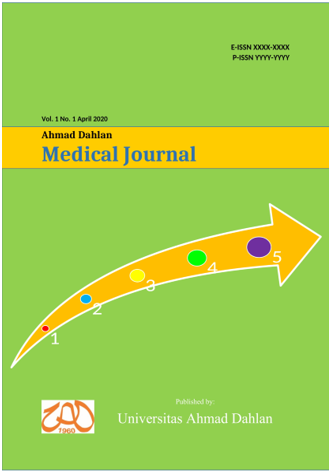Mini Review: The Potential of Piperine in Black Pepper in Improving Brain Work
DOI:
https://doi.org/10.12928/admj.v2i2.5437Keywords:
Mini Review; Potential of Piperine; Black Pepper; Brain Work; CognitiveAbstract
This study aims to determine the effect of piperine as an antidepressant and the potential to improve brain cognitive function. Researchers conducted a literature review related to piperine's potential for brain work using databases such as PubMed, Google Scholar, Cochrane Library. Search the relevant research literature using the keywords "Piperine in black pepper" or "piperine and brain effects". One of our conclusions is that piperine's cognitive-enhancing effects may occur in part through its cytoprotective and AChE inhibitory effects in the hippocampus.
References
Annu. Rev. Clin. Psychol. (2005). Stress and Depression. Los Angeles, California: Annual Review.
Christian Rafael Quijia, M. C. (2019). Characteristics, Biological Properties and Analytical Methods of Piperine : A Review. Critical Reviews in Analytical Chemistry, 1-16.
Emad M Abdallah, W. M. (2018). Black pepper fruit (Piper nigrum L.) as antibacterial agent: A mini-revirew. Journal of Bacterial & Mycology: Open Access, 141-1545.
Hidayati, L. N., & Harsono, M. (2021). Tinjauan Literatur Mengenai Stres Dalam Organisasi. Jurnal Ilmu Manajemen, 18(1), 20-30.
Jintanaporn, dkk. (2008). Piperine, the potential functional food for mood and cognitive disorders, Food and Chemical Toxicology. 46: 3106–3110.
John Wiley and Sons Inc., pp. 2717–2725. Shen, Y. and Li, R. 1995. ‘The role of neuropeptides in learning and memory: Possible mechanisms’, Medical Hypotheses, 45(6), pp. 529–538.
K Vasavirama, M. U. (2014). Piperine : A Valuable Alkaloid From Piper Species. International Journal of Pharmacy and Pharmaceutical Sciences, 34-38.
Larasati, Ratih. (2016). Pengaruh Stres Pada Kesehatan Jaringan Periodontal. Surabaya: Jurnal Skala Husada. Volume 13.
Pennapa Chonpathompikunlert, Jintanaporn Wattanathorn, Supaporn Muchimapura. (2010). Piperine, the main alkaloid of Thai black pepper, protects against neurodegeneration and cognitive impairment in animal model of cognitive deficit like condition of Alzheimer's disease. Food and chemical toxicology: an international journal published for the British Industrial Biological Research Association 48(3):798-802
Plein, L. M. and Rittner, H. L. (2018). ‘Opioids and the immune system – friend or foe’, British Journal of Pharmacology.
Tianjing Ren, Z. Z. (2019). Role of Piperine in CNS disease: pharmacodynamics, pharmacokinetics and drug interactions. Expert Opinion on Drug Metabolism & Toxicology.
Veening, J. G. and Barendregt, H. P. (2015). The effects of Beta-Endorphin: State change modification, Fluids and Barriers of the CNS. BioMed Central Ltd.
Downloads
Published
How to Cite
Issue
Section
License
Copyright (c) 2021 Dewi Yuniasih; Dandy Dewanto P, Putri Kinanthi, Nurul Aqidatul K, Naila Sistharani

This work is licensed under a Creative Commons Attribution-ShareAlike 4.0 International License.
License and Copyright Agreement
In submitting the manuscript to the journal, the authors certify that:
- They are authorized by their co-authors to enter into these arrangements.
- The work described has not been formally published before, except in the form of an abstract or as part of a published lecture, review, thesis, or overlay journal. Please also carefully read Ahmad Dahlan Medical Journal posting Your Article Policy.
- That it is not under consideration for publication elsewhere.
- That its publication has been approved by all the author(s) and by the responsible authorities - tacitly or explicitly - of the institutes where the work has been carried out.
- They secure the right to reproduce any material that has already been published or copyrighted elsewhere.
- They agree to the following license and copyright agreement.
Copyright
Authors who publish with Ahmad Dahlan Medical Journal agree to the following terms:
- Authors retain copyright and grant the journal right of first publication with the work simultaneously licensed under a Creative Commons Attribution License (CC BY-SA 4.0) that allows others to share the work with an acknowledgment of the work's authorship and initial publication in this journal.
- Authors are able to enter into separate, additional contractual arrangements for the non-exclusive distribution of the journal's published version of the work (e.g., post it to an institutional repository or publish it in a book), with an acknowledgment of its initial publication in this journal.
- Authors are permitted and encouraged to post their work online (e.g., in institutional repositories or on their website) prior to and during the submission process, as it can lead to productive exchanges, as well as earlier and greater citation of published work.


